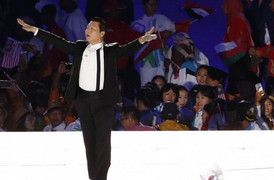![The international success of artists like PSY, pictured, has inspired a new generation of South Koreas to aspire to K-pop stardom. [AP File]](http://www.jstudentboard.com/reporter/wp-content/uploads/2015/03/JSR_March14_Psy.jpg)
According to friends and family interviewed by Inquisitr, Ahn fell into depression due to her career failures.
Ahn failed to debut as a singer after losing the KARA project competition, and in January her contract with DSP was terminated. She was impacted by pressures of wanting to debut, bitterness over being a trainee for five consecutive years, and tough competition with numerous other trainees.
An average Korean Pop star trains for singing, acting, dancing, and modeling for four years, often beginning in elementary or middle school. Ahn’s career may have resembled that of the stars in YG Entertainment’s “WIN: Who is Next,” a 2013 TV program depicting the lives of trainees. The program revealed them staying up until 3 am to practice, visiting the hospital to treat physical pains, and calling parents they had not seen for years.
“I personally loved the show, and it was really entertaining. But I couldn’t help but realize how sad it was for [the aspiring stars] to sacrifice the strong brotherly bond amongst each other and the normal yet carefree lives normal teenagers live,” said Claire Lee, a viewer of the show.
In a New York Times article from August 2013, Sang Hun Choe highlights the story of 13-year-old Chae Young Kim, who dreams of one day becoming a famous K-pop star. Since 2009, Kim has attended the Def Dance School in South Korea and practiced her hip-hop moves until very late at night.
Kim is not alone. She and many other students at the Def Dance School and other dance schools in South Korea practice hard and dedicate their time to singing and dancing.
“My classmates are cramming for college entrance exams,” stated JiWon Woo, another Def Dance student, to the Times. “But I go to a Kpop school seven evenings a week. After coming home past 10, I study K-pop videos on YouTube for hours.”
Yet only a few people can become stars, no matter how many hours they practice. Moreover, success may only come due to arbitrary factors.
“Making it” in the Korean entertainment industry is harder than it may seem. On an Ilgan Sports article by Hyun Taek Park about trainees’ lives, a reader commented, “Making it in the entertainment industry is 90% based off of landing a good sponsor or pure luck. It’s because the market is so saturated that there is no viable career opportunity for the actual talented people who dream of becoming singers.”
Joan Kim, an avid Korean Pop fan and junior at West Ranch High School, told JSR, “The training periods… are hopeless and cruel. I have watched K-pop idols confess that they were scared every day during their trainee days because they were not sure whether they would even debut even though they had trained for such a long time.”
A new generation of Kpop artists are becoming more aggressive and passionate, and dance schools are continuing to open for those who seek training. Thus, the number of Korean Pop trainees will only increase, and competition among the talented will increase as well.
As the expectations and dreams of the trainees soar, Ahn’s death shows that society should wonder about what may happen if they don’t succeed.

